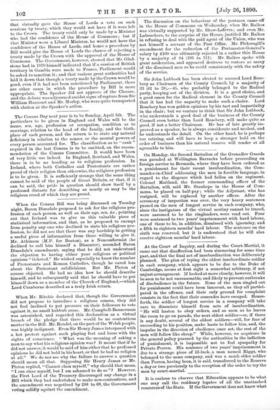At the Court of Inquiry, and during the Court-Martial, it
came out that disaffection had been simmering for some time past, and that the final act of insubordination was deliberately planned. The plan of trying the oldest insubordinate soldier in each company, which appears to be due to the Duke of Cambridge, seems at first sight a somewhat arbitrary, if not unjust arrangement. If looked at more closely, however, it will be seen to be not unreasonable, and likely to prevent outbreaks of disobedience in the future. None of the men singled out for punishment could have been innocent, as they all partici- pated in the offence, and their only ground for complaint consists in the fact that their comrades have escaped. Hence- forth, the soldier of longest service in a company will take care to dissociate himself from acts of insubordination. "He will hasten to obey orders, and as soon as he leaves the room to go on parade, the next oldest soldier—or, if there is any doubt, several of the oldest soldiers—will, for fear of succeeding to his position, make haste to follow him, and, the impulse in the direction of obedience once set, the rest of the men will follow like sheep." While, however, we acquiesce in the general policy pursued by the authorities in the infliction of punishment, it is impossible not to feel sympathy for Private Perren. His sentence of two years' imprisonment is due to a strange piece of ill-luck, a man named Riggs, who belonged to the same company, and was a much older soldier than Perren, having been, it is said, transferred to the Reserve a day or two previously to the reception of the order to try the men by court-martial.


































 Previous page
Previous page